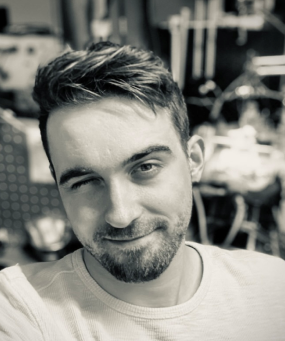- Homepage
- Programme
- Registration
- Practical Guide
- About Neuronus

Łukasiewicz–PORT, PL; KCL, UK

Mateusz Kucharczyk earned a BSc (2012) and an MSc (2014) in Biotechnology from Jagiellonian University in Kraków. Subsequently, as a Marie Skłodowska-Curie trainee, he completed his PhD in Neuroscience (2019) at University College London, specialising in in vivo electrophysiology with Professor Anthony Dickenson and in vivo calcium imaging with Professor Stephen McMahon (King’s College London) to study cancer-induced bone pain. Successively, as a PDRA in Dr Kirsty Bannister group (King’s), he advanced opto- and chemogenetic techniques for studying descending modulatory circuits in health and disease. Currently he develops Cancer Neurophysiology research group at Łukasiewicz-PORT in Wrocław.
The human experience is intricately woven with sensations like touch, pain, thermosensation, and internal awareness, all of which play crucial roles in shaping physiological, behavioral, and emotional responses. At the forefront of somatic sensation are peripheral sensory neurons. These neurons possess the ability to convert stimuli from both the external environment and the body's internal workings into electrical signals, transmitting them to the spinal cord and brain. Conversely, the brain employs various top-down modulation mechanisms to regulate the ascending sensory pathways. However, the mechanisms governing communication in both directions can be disrupted by inflammation or disease, leading to debilitating symptoms such as chronic pain. Therefore, identifying the physiological properties and genetic identity of cells within neural circuits involved in somatosensory processing is crucial for advancing modern medicine. The goal of this symposium is to showcase research that explores how the nervous system senses internal and external stimuli and how this information is processed and modulated through neural pathways in normal physiological conditions as well as in disease models. The research discussed encompasses studies conducted on transgenic animals and human participants, utilizing state-of-the-art imaging techniques. This approach has allowed for new insights into topics such as the central control of cancer pain, the transcriptomic identity of neurons innervating the skin and internal organs, and the interplay between biomechanics and the function of tactile organs.
Neuronal pathways travel from the brain to the spinal cord to influence somatosensation. They regulate spinal and primary sensory neuron activity, enabling the brain to finely tune signal levels transmitted through the spinal cord and govern the periphery via neurogenic mechanisms. Our laboratory's dual focus on the somatosensory system and cancer neuroscience seeks to uncover the system's involvement in neurogenic mechanisms governing tumorigenesis and related pain. Employing a combination of in vivo electrophysiology and calcium imaging with selective opto- and chemogenetic modulation of genetically and anatomically defined neuronal circuits, we sample the activity in the spinal and peripheral neurons and correlate this activity with behavioural responses using machine learning-supported analysis. We aim to link network-wide brain activity with top-down ability to influence both nociception and tumorigenesis. In this pursuit, we aspire to forge innovative therapies for cancer and associated pain, rooted in a deep understanding of neuronal systems.